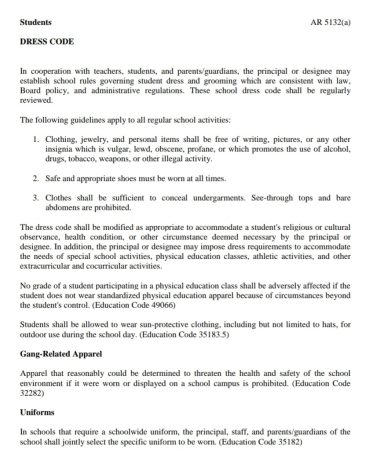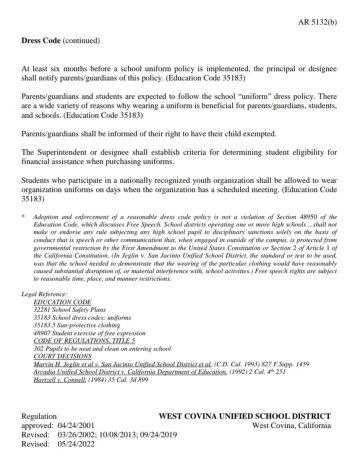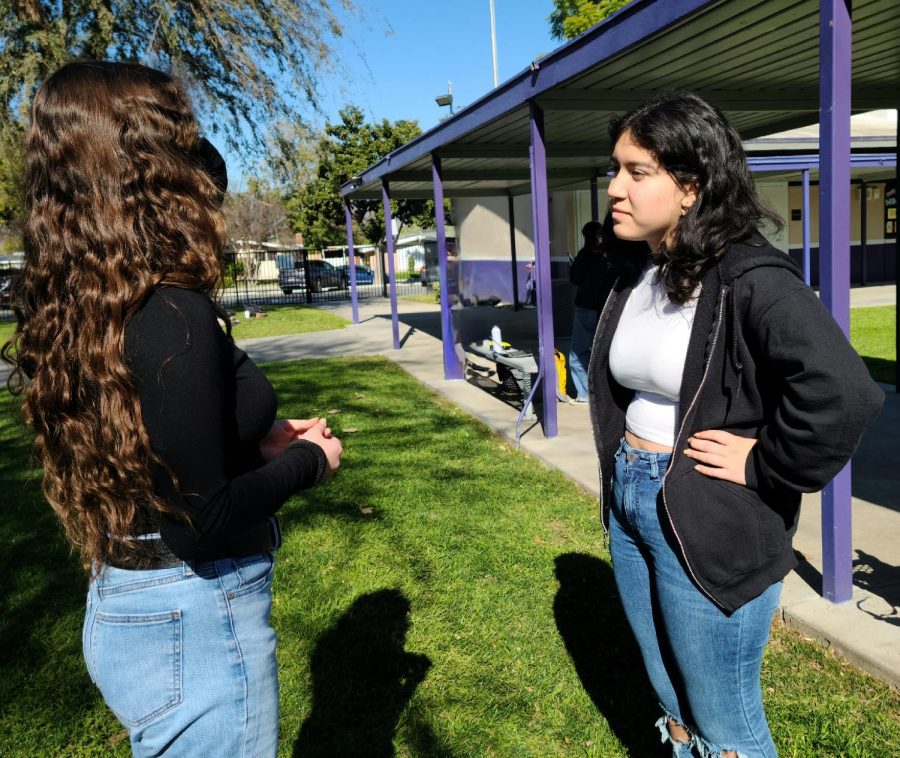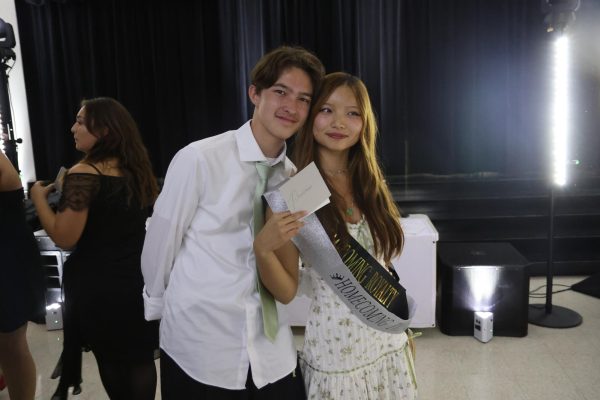Has Progress Been Made? The Downfall of the Dress Code
Image by Julia Pollard
Samantha Soto (left) and Karen Sanchez (right) discuss the dress code.
There was an uproar on campus over the change in the dress code last year, and this year as well.
Many MECA students feel that students around the world, in every school, are constantly being oversexualized, specifically female students. Even though it is 2023, they feel that they are still seen as objects.
“Women are already objectified and the dress code just adds to that to make it worse,” Sophomore Karen Sanchez feels.
Last year, a few 12th-graders created a survey asking the student’s thoughts on the dress code. They hung the QR codes for the survey around campus where they would be easily accessible to students. The survey consisted of questions about how the dress code made students feel and if it was sexually targeted.
Some eleventh graders, who are now seniors, were on the dress code committee last year, to seek change for students. One of them, current senior Melvyn Hernandez, spoke a bit about his work on the committee last year.
He explained that his duty was to “share student perspectives.” He, along with other seniors, did this by meeting with faculty from the district to discuss their issues with the dress code.
His passion for this topic came from witnessing the “racially motivated and sexually suggestive content” that he feels is wrong to assume of minors.
Most MECA students this year feel that there was no need to change the dress code because “in the 4 previous years the dress code was lax but now it’s suddenly gotten stricter,” according to Sanchez. She also believes that the dress code gives people the power to “think that they can judge someone solely based on appearance.”
“It should be more of a choice of how you dress instead of it being seen as a ‘distraction,’” thinks Samantha Soto, sophomore. Additionally, she believes “it should be the people ‘distracted’ who need to change and not the person just peacefully existing.” Soto explains, “I think it’s important that people educate their children instead of telling us to cover up the bodies we were born with.”
Both Soto and Sanchez agree that the reason for a strict dress code is outdated. “I’m so tired of hearing excuses like there’s too much shoulder exposure, skirts or shorts that are ‘too short’ or tops that are ‘too revealing,’” Soto continued. She believes that this problem can be solved if “those people who see it as a problem can respectfully keep it to themselves.” Similarly, Sanchez says that what is taught at school contradicts the rules set in place by the administration.
The quote, “Never judge a book by its cover,” is constantly being taught by teachers, yet they are quick to pass judgment when they see someone wearing something that goes against the dress code. However, many students at MECA don’t judge people based on their appearance, but in the world, “Many women, non-binary, and gender-fluid people definitely live in fear that what they’re wearing will let people think that they can speak to them a certain way which is obviously not true,” Sanchez adamantly states.
Vice principal of MECA, Tomoko Price did not have a part in creating the dress code, but she was able to watch as students at her previous school went through the dress code and critiqued it. “Last year, over the entire course of the school year, students from all of our secondary schools, an administrator, and a teacher had five different meetings and they went through and worked on the dress code together so it was completely revamped,” Price explained. They took this action because the old dress code was just that – old.
As Price puts it, it is “circa 1990s.” Many students felt that it was unfair, specifically the female students felt that it was more targeted towards them and tried to speak up. Price saw this firsthand and shared, “some of the girls that were on the committee last year felt it was more discriminatory towards the girls than the boys.”


Students feel that male students rarely get dress coded. Melvyn Hernandez thinks that the dress code’s hypocrisy and targeted sexualization are very evident. He shares the example of staff “assuming that what someone is wearing will cause a ‘distraction’” when “a bright-colored shirt could very easily do the same thing.” Therefore, according to Hernandez, it should not be considered a distraction for a student to wear something that has skin exposure. He feels that the dress code “teaches students to not express themselves in the world” due to the fear that people will think negatively of them.
Hernandez feels that the dress code doesn’t need to be “sexually suggestive.” It should “only be put in place to fairly protect all students not from their peers, but in a physical safety sense.” He thinks that if a student is wearing something that their parent/guardian was okay with then no one else should be able to comment on it.
Students and staff hope that there will be some progress being made for the treatment of women and girls around the world.
There are currently no plans from the district to change the dress code. If you are interested in getting more involved or want to speak about a topic, then feel free to look at the club directory to see what social justice clubs you could join. Additionally, you could join ASB, Journalism, or Link Crew (replacing peer leadership next year) to have more of an impact on campus.
Your donation will support the student journalists of Mt. SAC Early College Academy. Your contribution will allow us to purchase equipment and cover our annual website hosting costs.

Julia Pollard, a senior here at MECA, is very involved in day-to-day school activities. She is an editor in her third year in journalism. She is ASB Secretary,...







